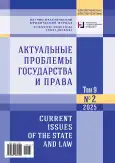Legal prohibition in the mechanism of the State’s criminal policy
- Authors: Mikautadze S.R.1
-
Affiliations:
- Russian Academy of National Economy and Public Administration under the President of the Russian Federation, Lipetsk Branch
- Issue: Vol 9, No 2 (2025)
- Pages: 273-280
- Section: Current Issues of Criminal Legal Sciences
- URL: https://journal-vniispk.ru/2587-9340/article/view/295367
- DOI: https://doi.org/10.20310/2587-9340-2025-9-2-273-280
- ID: 295367
Cite item
Full Text
Abstract
The article scientifically analyses the functional role of legal prohibition as an instrument of ordering the most significant social relations in the conditions of modern tendencies of criminal policy of the state. The social essence of legal prohibition as a method of legal regulation, as well as an important and integral tool of the mechanism of criminal policy of the state is investigated. The conclusion that the legal prohibition, being an expression of a part of positive social relations, provides their protection from inadmissible, categorically condemned by society criminal behavior and, therefore, exists objectively and independently of the mechanism of criminal-legal regulation is substantiated. Special attention is paid to the study of the socio-legal role of legal prohibition in the mechanism of criminal policy to counteract crime. The thesis that the legal prohibition, as well as permissions and prescriptions, are general legal tools of ordering social relations and have no branch affiliation is voiced. The conclusion about two interrelated concepts of modern domestic criminal policy: social and legal impact and criminal law regulation, as well as about the central place in the content of these concepts of the functional role of the legal prohibition and the institute of criminal punishment. It is concluded that the application of legal prohibition in the process of criminalization of unlawful acts should not contradict the socio-legal essence of this phenomenon and the doctrine of criminal law, on which the construction of criminal law and law enforcement practice are based. The conflict of conformity, desirable and possible in the context of modern trends in criminal policy has become the subject of this study, and the proposed conclusions emphasized its relevance and substantiated its practical significance. The purpose of the study is to scientifically substantiate a conceptual approach to understanding the mechanism of criminal law regulation and its practical application in the context of modern trends in criminal policy of the state on the basis of a reasoned idea of the social essence of legal prohibition. The methodological basis of the study was provided by both general scientific methods of cognition (dialectical method, analysis and synthesis, induction and deduction) and private legal methods: comparative-legal, formal-legal, concrete-sociological and others. The use of these methods allowed to provide a comprehensive study of legal prohibition as a socio-legal and legal phenomenon, to give a legal characterization and assessment of its functional significance in the mechanism of domestic criminal policy. The practical significance of the study lies in its focus on the analysis of the functional role of legal prohibition in the mechanism of criminal law regulation, substantiating the scientific concept of the construction and application of criminal law norms in domestic law enforcement practice.
About the authors
Sergey R. Mikautadze
Russian Academy of National Economy and Public Administration under the President of the Russian Federation, Lipetsk Branch
Author for correspondence.
Email: mikautadze.s@yandex.ru
ORCID iD: 0009-0007-0198-5947
Cand. Sci. (Law), Associate Professor of Criminal Law, Process and Criminalistics Department
Russian Federation, 3 Internatsionalnaya St., Lipetsk, 389050, Russian FederationReferences
- Malko A.V. (2012). Prohibitions as a means of legal policy. Vestnik Samarskoi gumanitarnoi akademii. Se-riya «Pravo» = Bulletin of the Samara Humanitarian Academy. Law Series, no. 1 (11), pp. 3-11. (In Russ.) https://elibrary.ru/pgcwft
- Lyapunov Yu.I. (2005). Criminal law: subject matter and method of regulation and protection. Ugolovnoe pravo = Criminal Law, no. 1, pp. 48-52. (In Russ.)
- Karpushin M.P., Kurlyandskii V.N. (1974). Criminal Liability and the Offence. Moscow, Yuridicheskaya li-teratura Publ., 232 p. (In Russ.)
- Bavsun M.V. (2013). Ratio criminal law and criminal law regulation. Sibirskii yuridicheskii vestnik = Sibe-rian Law Herald, no. 2 (26), pp. 56-63. (In Russ.) https://elibrary.ru/qbdqcb
- Mikautadze S.R. (2024). Public relations as a subject of criminal law regulation and an object of social and legal impact. Aktual’nye problemy gosudarstva i prava = Current Issues of the State and Law, vol. 8, no. 1 (29), pp. 85-93. (In Russ.) https://doi.org/10.20310/2587-9340-2024-8-1-85-93, https://elibrary.ru/spcxti
- Shmatkova E.M. (2011). State-legal influence on economy in the Russian Federation. Sotsial’no-ekonomicheskie yavleniya i protsessy = Social-Economic Phenomena and Processes, no. 5-6 (27-28), pp. 260-264. (In Russ.) https://elibrary.ru/ojlhbh
- Brainin Ya.M. (1963). Criminal Liability and Its Basis in Soviet Criminal Law. Moscow, Yuridicheskaya li-teratura Publ., 275 p. (In Russ.)
- Tatsiy V.Ya. (1986). Object and Subject of the Crime. Moscow, Gosizdat Publ., 212 p. (In Russ.)
- Alekseev S.S. (1999). Law: ABC – Theory – Philosophy: Experience of Comprehensive Research. Moscow, Statut Publ., 712 p. (In Russ.) https://elibrary.ru/rmlyff
- Babaev M.M., Pudovochkin Yu.E. (2016). The repressive approach to addressing social issues: causes and consequences. Vserossiiskii kriminologicheskii zhurnal = Russian Journal of Criminology, vol. 10, no. 3, pp. 419-430. (In Russ.) https://doi.org/10.17150/2500-4255.2016.10(3).419-430, https://elibrary.ru/wzytlx
Supplementary files

Note
Author’s contribution
S.R. Mikautadze – concept development, collection and processing of normative materials, selection of literature, writing – original draft preparation, preparation of the manuscript in accordance with the requirements of the Editorial Board.







